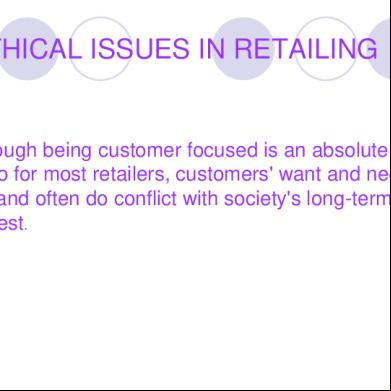Ethical And Legal Issues In Retailing 5y5f2h
This document was ed by and they confirmed that they have the permission to share it. If you are author or own the copyright of this book, please report to us by using this report form. Report 2z6p3t
Overview 5o1f4z
& View Ethical And Legal Issues In Retailing as PDF for free.
More details 6z3438
- Words: 455
- Pages: 14
Ethical and Legal Issues in Retailing & Inventory Management
Presented By: Vijay Dhruv (111) Saurav (118)
What Are Ethics: • It is the behavior that a business adheres to in its daily dealings with the world. • Written and Unwritten policy that specifies whai is good or bad behaviour.
Codes Of Ethics: • Explicit code: Written policy that specifies what is ethical and unethical behavior. • Implicit code: Unwritten but well understood set of rules/standards of moral responsibilities.
Dealing with Ethical Issues: • Awareness of Ethical issues. • Moral Philosophy, Intentions and Behaviour.
• The Organizational Environment. • Company Ethics Programs.
2 world’s largest retail chains made ethics last week… • Former marketing communications chief Julie Roehm of WalMart fired due to by accepting discounts and gifts from vendors. • Coles Group, Australia adopted an ethical sourcing code that it says will protect workers who supply the chain’s footwear and apparel. – Mainly focuses on China – Workplace safety. – Living conditions of factory workers.
Ethical Issues In Retailing:
Consumer Fraud.
Supplier Labour Practices.
Slotting Allowance.
Use of Customer Information.
Ecological Considerations.
Legal Framework: The Delhi Shops & Establishment Act, 1954 The Delhi Sales Tax Act The Consumer Protection Act,1986 Service Tax Provision s Labour Laws Competition Act
Advantages Of Ethics IN Retailing: • Higher revenues. • Improved Brand, Business Awareness and Recognition. • Better employee Motivation and Recruitment.
Inventory Management • It is the process of efficiently overseeing the constant flow of units into and out of an existing inventory. • It helps in controlling the costs associated with the inventory
What Is Retail Inventory Management? • It is the process and methods used to keep track of the stock in a retail business. • It controls everything from ordering, shipping, receiving, tracking inventory, retail turn-over, and storage. • Retail inventory management can help keep a business’ profits at a steady margin as well as reducing theft and loss of inventory
How To Manage Inventory? • Point-of-sale terminals – These are check-out points that automatically update a company’s inventory levels. • Job costing and inventory systems – Another automatic system that updates computerized levels of inventory.
Contd. • Barcodes and readers – Every product these days contains a barcode with the items information. Barcodes makes it easy and quick track stock. • Electronic Supplier Product catalogs – This system can update inventory levels automatically through either the internet or media disk.
Why Inventory Management? • To retain his existing customers. • To attract potential buyers. • Retailer should have sufficient stock to offer during the “lead time”. • Its helps in at the time of uncontrollable situations like transport strikes, curfews, crises etc.
Presented By: Vijay Dhruv (111) Saurav (118)
What Are Ethics: • It is the behavior that a business adheres to in its daily dealings with the world. • Written and Unwritten policy that specifies whai is good or bad behaviour.
Codes Of Ethics: • Explicit code: Written policy that specifies what is ethical and unethical behavior. • Implicit code: Unwritten but well understood set of rules/standards of moral responsibilities.
Dealing with Ethical Issues: • Awareness of Ethical issues. • Moral Philosophy, Intentions and Behaviour.
• The Organizational Environment. • Company Ethics Programs.
2 world’s largest retail chains made ethics last week… • Former marketing communications chief Julie Roehm of WalMart fired due to by accepting discounts and gifts from vendors. • Coles Group, Australia adopted an ethical sourcing code that it says will protect workers who supply the chain’s footwear and apparel. – Mainly focuses on China – Workplace safety. – Living conditions of factory workers.
Ethical Issues In Retailing:
Consumer Fraud.
Supplier Labour Practices.
Slotting Allowance.
Use of Customer Information.
Ecological Considerations.
Legal Framework: The Delhi Shops & Establishment Act, 1954 The Delhi Sales Tax Act The Consumer Protection Act,1986 Service Tax Provision s Labour Laws Competition Act
Advantages Of Ethics IN Retailing: • Higher revenues. • Improved Brand, Business Awareness and Recognition. • Better employee Motivation and Recruitment.
Inventory Management • It is the process of efficiently overseeing the constant flow of units into and out of an existing inventory. • It helps in controlling the costs associated with the inventory
What Is Retail Inventory Management? • It is the process and methods used to keep track of the stock in a retail business. • It controls everything from ordering, shipping, receiving, tracking inventory, retail turn-over, and storage. • Retail inventory management can help keep a business’ profits at a steady margin as well as reducing theft and loss of inventory
How To Manage Inventory? • Point-of-sale terminals – These are check-out points that automatically update a company’s inventory levels. • Job costing and inventory systems – Another automatic system that updates computerized levels of inventory.
Contd. • Barcodes and readers – Every product these days contains a barcode with the items information. Barcodes makes it easy and quick track stock. • Electronic Supplier Product catalogs – This system can update inventory levels automatically through either the internet or media disk.
Why Inventory Management? • To retain his existing customers. • To attract potential buyers. • Retailer should have sufficient stock to offer during the “lead time”. • Its helps in at the time of uncontrollable situations like transport strikes, curfews, crises etc.










